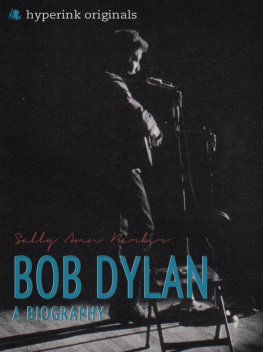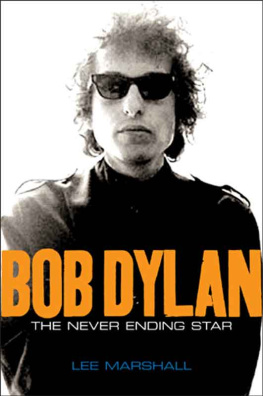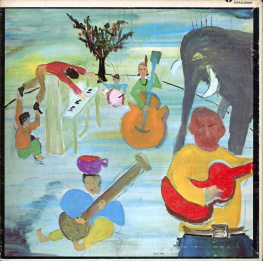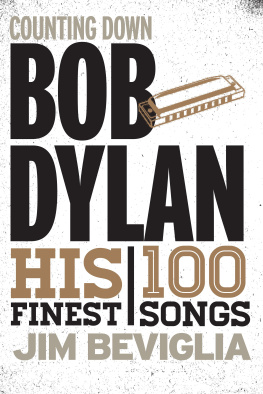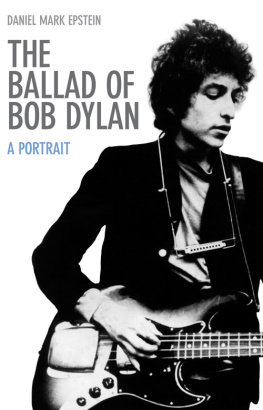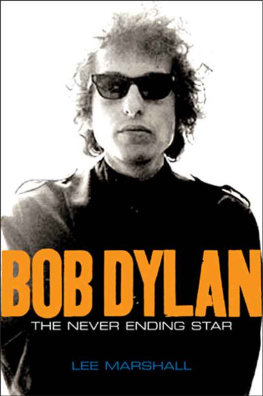Bob Dylan: A Biography
I.
Bob Dylan: A Biography
Pops Poet Laureate
In 2012, 70-year-old Bob Dylan marked the 50th anniversary of his debut album, Bob Dylan. For a half-century, the artists genius forged modern culture and challenged ideas of what it meant to be a musician. Dylan pushed the envelope in the music world time and again. He was a reluctant spokesperson for the protest movement of the 1960s. His driven creative journey through music genres, film, literature and painting established a rich body of work provocatively articulating the human experience of the late 20th and early 21st centuries.
Dylans second album, The Freewheelin Bob Dylan , was released in 1963. Unlike the earlier folk album, it primarily contained original songs, including the iconic Blowin In the Wind, and anti-war songs, Masters of War and A Hard Rains A-Gonna Fall. Established artists Peter, Paul, and Mary, and Joan Baez recorded Dylans new wave protest music, launching his image as a spokesperson of the Vietnam anti-war era. Despite populace pressure, it was a role Dylan refused to claim. Songs from the period, such as Blowin In The Wind and The Times They Are a-Changin found their way into the American songbook.
Dylans poetic, literate folk songs ignited new possibilities for the singer-songwriter. Only two years after coming on the scene, Dylans fresh style and innovation was to revolution the rock genre. He stunned crowds at the 1965 Newport Festival when he abandoned his acoustic guitar for an electric guitar. Viewed by many as an unforgivable betrayal of folk music traditions, fans booed, but there was no turning back. The marriage of folk to rock was consummated.
Many quickly recognized Dylans rare genius. Rock and Roll Hall of Fame Museum reported that folksinger Pete Seeger, one of Dylans early influences, is known to have said of the young musician, Hell be Americas greatest troubadour, if he doesnt explode. Over the years, Dylan proved he was capable of managing his prolific genius. Throughout his career, he remained true to a path defined by his artistic instincts. It inspired an ever-changing repertoire and a long list of achievements and prestigious awards. While not all of Dylans works were received warmly by fans and critics, his career never appeared manipulated by critical response.
Dylans antics filmed in 1965 for D.A Pennebakers documentary Dont Look Back fostered the birth of the music video. Tapes from Dylans informal sessions with The Band are considered among the genres first bootleg material, according to an iTunes biography of the artist. Fans were periodically led into new musical directions. In the late 1970s, Dylan announced he was a born-again Christian. The announcement was followed by the release of three religious albums.
In 2008, Dylan broke more ground when he added the prestigious Pulitzer Prize to his extensive list of awards. Billboard reported, It was the first time judges, who have long favored classical music, and, more recently, jazz, awarded an art form once dismissed as barbaric, even subversive. Noting Dylans powerful influence, the Pulitzer citation celebrated the artist for his profound impact on popular music and the American culture, marked by lyrical compositions of extraordinary poetic power.
In his seventh decade, Bob Dylan continues to gift audiences with insights, innovations, and enduring and unique artistic voice.
A Modern Troubadour Grows Up
Bob Dylans early years were blessed by a stable family life and the benefits of a traditional hard-working American community. Dylans parents, the vivacious Beatrice (Beatty) Stone and the shy Abe Zimmerman, married in 1934 when the country was struggling to emerge from the Great Depression. With money tight, the young Jewish couple lived with Beattys mother in Duluth, Minnesota, wrote Howard Sounes in his book , Down the Highway: The Life of Bob Dylan . On May 24, 1941, Bob Dylan entered the world. The baby was given two names, Sounes noted. Dylan was given the Hebrew name Shabtai Zisel ben Avraham and also Robert Allen Zimmerman.
Two important events occurred in young Dylans life in 1946. His brother David Benjamin was born and the family moved 75 miles northwest of Duluth to Hibbing, Minnesota. Sounes stated the move was prompted by a need to live closer to family members after Abe was afflicted with polio.
Bob Dylans hometown of Hibbing is located in St. Louis County. The city is the self-proclaimed Iron Capital of the World. Frank Hibbing, a German, established the community in 1893 after he discovered iron ore in the region, which then fueled a strong mining industry. The entire town was relocated two miles in the 1920s, one building at a time, to mine ore discovered beneath the settlement. The town gradually grew in population. By 2010, the community could boast of 16,000 residents.
While Bob Dylans first years were marked by the events of World War II, the post-war years provided an optimistic environment. The socially significant Baby Boom was underway. The positive mood of the country was reflected in the 1946 release of the iconic movie, Its a Wonderful Life . It was in post-war Hibbing, Bobby, as he was called by friends and family, enjoyed boyhood riding bikes, swimming, fishing, skating and other common activities.
Dylans interest in music and language emerged early. Bobby presented his first concert at a family gathering when he was just four years old, according to Sounes. As a youngster, he wrote poems for his mother and father. It is documented by the Rock and Roll Hall of Fame Museum that by the time he was ten years old, Dylan had learned how to play piano and harmonica. He taught himself to play guitar and while still in high school, he formed a band called the Golden Chords.
Following high school graduation in 1959, Dylan enrolled at the University of Minnesota at Minneapolis to study art. A Rolling Stone magazine biography states Dylan lasted only three semesters at the university and during this brief college career he performed folk songs at coffeehouses under the name Bob Dylan. Dylan adopted the name from the famous Welsh poet Dylan Thomas. Dylan Thomas was also known as prolific artist from an early age. Born in 1914, the poet is remembered for his plays Under Milk Wood and Portrait of the Artist as a Young Dog . Bobby Zimmerman legally assumed the name Bob Dylan in August 1962.
The summer of 1960, Dylan lived in Denver, Colorado. It was here he made the commitment to build a music career. An iTunes biography notes the budding musicians encounter with blues artist Jesse Fuller that summer was key to Dylans musical development.
The following January, Dylan left the Midwest behind to pursue his music career in New York City. There was another reason Dylan wanted to be in the Big Apple: he wished to connect to one of his greatest musical influences, Woody Guthrie.
Folk singer/songwriter Woody Guthrie is one of the most celebrated artists of Americas Dust Bowl Days. Of the 3,000 songs he wrote, his most beloved song, This Land is Your Land , is still learned by school children around the country. During the 1930s and 1940s, Guthries political protest music centered on a variety of social causes, such as union organizing, anti-fascism, and peace. Guthrie was hospitalized later in life when symptoms of Huntingtons Chorea, a degenerative disease of the nervous system, took hold and essentially robbed him of his talent.
While hospitalized, many young folksingers visited Guthries bedside. They brought their guitars, their songs and their appreciation. The Woody Guthrie website reports, along with Bob Dylan, Joan Baez, Phil Ochs and the Greenbriar Boys were visitors. It was during this period Dylan commemorated his musical hero with his tune,

